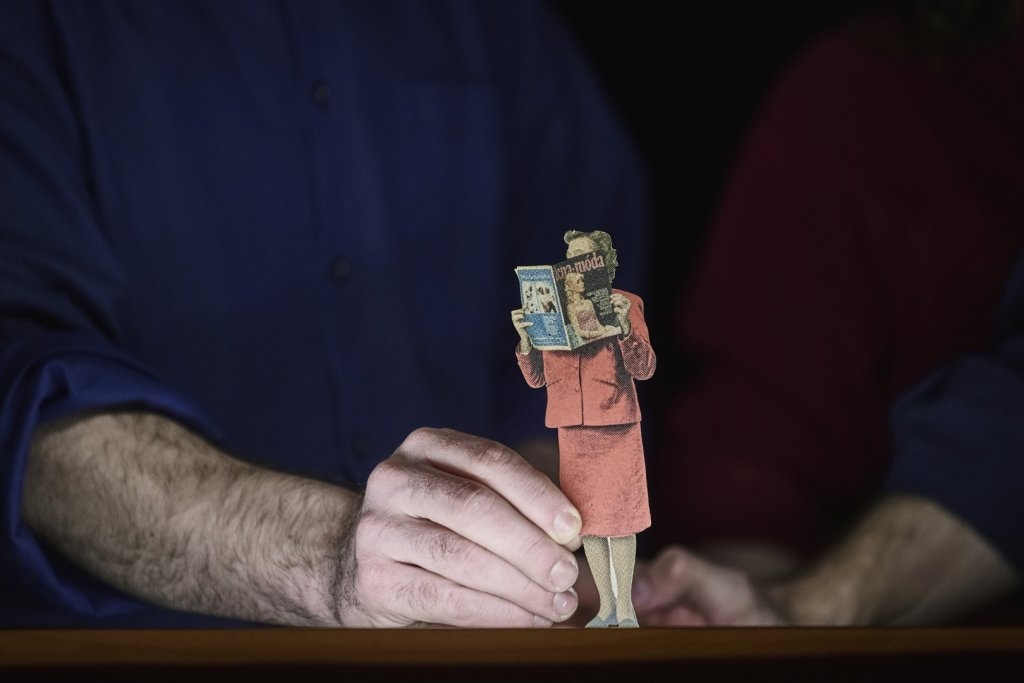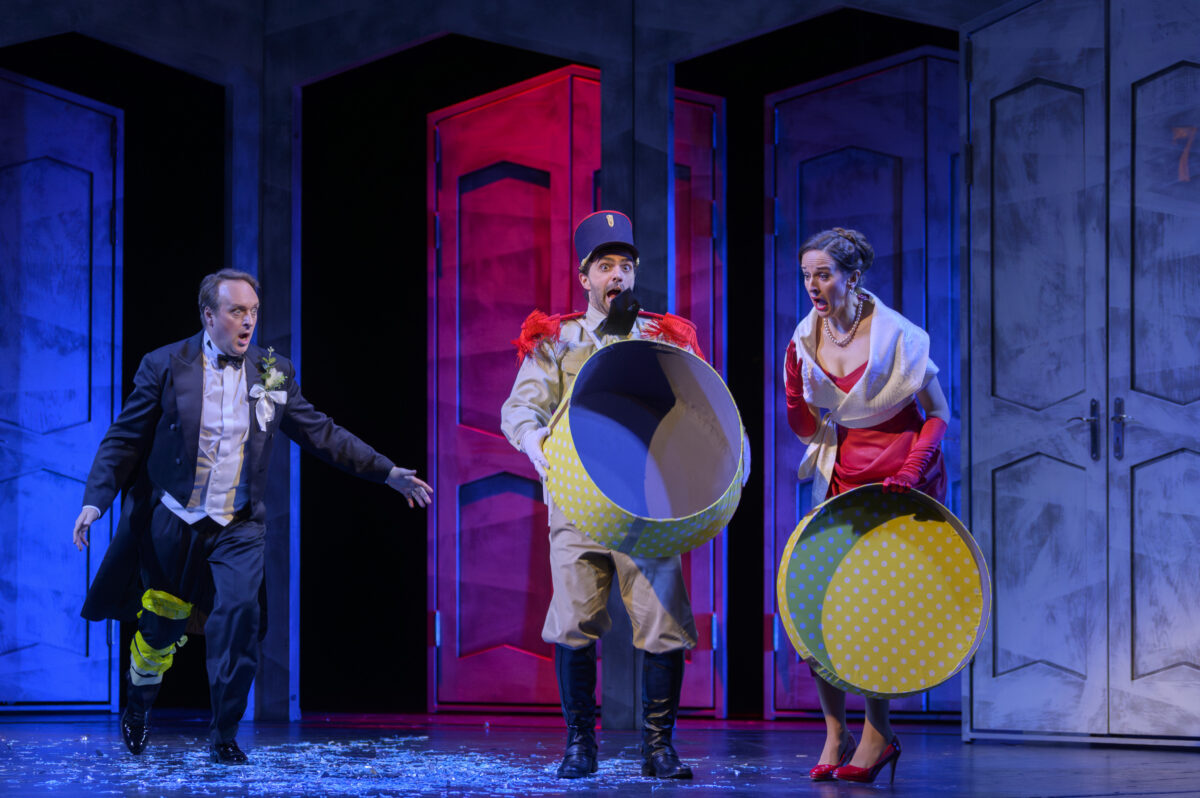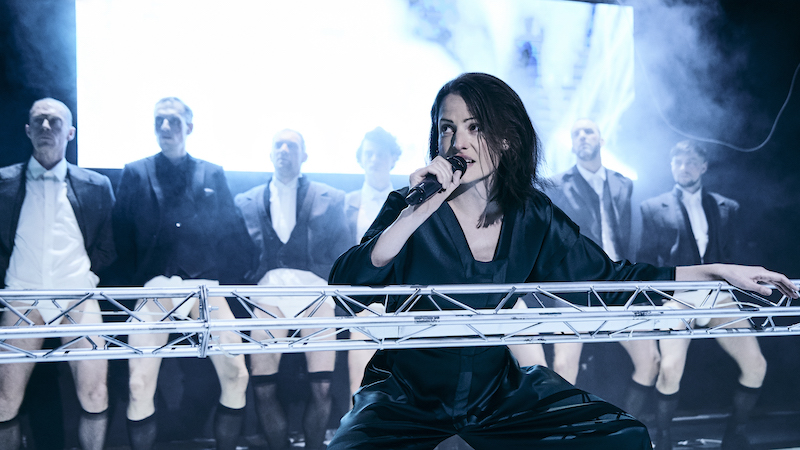Music Theatre 2019–2023
Restless Seeking Backed by Solid Tradition
With a population of 10.5 million, the Czech Republic has one of the densest opera networks in the world. Ten permanent opera ensembles, established by the cities of Brno, Ostrava, Pilsen, Liberec, České Budějovice, Ústí nad Labem and Opava and, in the case of the National Theatre, the Ministry of Culture, present 40 premieres a season. This, though, is “just” the foundation of a tradition that festivals and other ensembles contribute to with tireless creativity. Even in a seemingly conservative genre such as opera, studio and alternative works with unique aesthetics or historically-informed approaches to performing “old” music generate variety and vitality.
Unconventional Interpretations and Dramaturgical Discoveries
Attempts at unconventional interpretations are to be found even amongst the time-tested repertoires of the permanent ensembles, such as at the Moravian Theatre in Olomouc, where Antonín Dvořák’s “fairytale” Rusalka, 1 the story of a water nymph, has been adapted into the tale of a girl for whom not even plastic surgery spells happiness and a man driven to madness by watching erotic videos. Opera Studio Prague brought the park surrounding the Dvořák memorial in Vysoká u Příbramě to life with another production of Rusalka, 2 performed in the same location where it was conceived. In Pilsen, the J. K. Tyl Theatre commissioned a new work by Sylvie Bodorová, Quo Vadis. 3 This composer, whose works are presented by leading singers at important festivals and abroad, does not view melody as stale, or outdated, and the selection of Henryk Sienkiewicz’s novel as the opera’s source material took on a current urgency due to the war in Ukraine. In Monument, 4 for the National Theatre Brno, composer Marko Ivanović and librettist and director David Radok were inspired by the timeless topic of the relationship between artists and the powers that be, examining it through the tragic fate of sculptor Otakar Švec, who, compelled by communism of the 1950s, created the giant composite sculpture featuring Stalin in Prague’s Letná Park.
The project Musica non grata emerged as a dramaturgical strand for the National Theatre in Prague and the National Moravian-Silesian Theatre. The project aimed to recognise authors impacted by national socialism or persecuted in interwar Czechoslovakia due to their religion, race, politics or gender. This is how the State Opera came to perform Kurt Weill’s Sedm smrtelných hříchů (Seven Deadly Sins) and Arnold Schönberg’s Očekávání (Expectation), followed by Franz Schreker’s Vzdálený zvuk (The Distant Sound), Plameny (Flames) by Erwin Schulhoff, Šaty dělají člověka (The Clothes Make the Man) by Alexander Zemlinsky and Paul Abraham’s operetta Ples v hotelu Savoy (Ball at the Savoy), as well as Švanda dudák (Schwanda the Bagpiper) by Jaromír Weinberger at the National Theatre. Hans Krása’s opera Zásnuby ve snu (Betrothal in a Dream) was organically woven into the dramaturgy of the Ostrava opera, along with two of Ullmann’s one-act operas: the satire Rozbitý džbán (The Broken Jug) and the political caricature Císař Atlantidy (The Emperor of Atlantis). These productions, in particular, confirmed that presenting operas by “undesirable” composers makes sense not only as a means of righting the wrongs of the past, but also as an innovative enrichment of the programming available to today’s opera-goers. In this context, the opera Bílý pán aneb těžko se dnes duchům straší (The Gentleman in White, or It’s Tough Scaring Ghosts Today) was a literal revelation. In this work, composer Jaroslav Křička deftly handles the multi-genre foment of the interwar period but, after a series of international productions in the early 1930s, the opera became merely a note in history. The Ostrava creative team infused Křička’s work with the nostalgia of First Republic-era films, treading a fine line between romance, a variety of revue styles and the “sublimity” of opera.
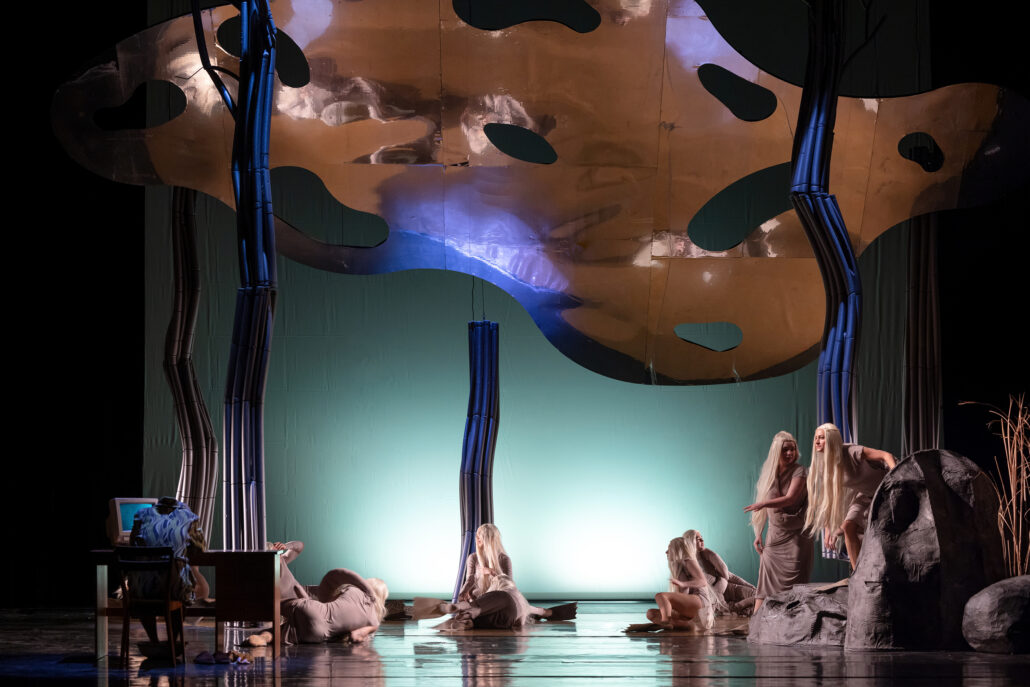
Festival “Spice”
A number of festivals add spice to operatic business as usual. The OPERA biennale is the representative showcase of productions by Czech opera ensembles. Held in Prague since 1993, it features Slovak theatres alongside Czech ensembles. Individual editions of the festival are unlimited by theme and the individual theatres decide what productions they want to showcase in Prague. This approach leaves room for dramaturgical diversity and varied interpretations.
In contrast, the Janáček Brno festival, organised by the National Theatre Brno, is associated with a single individual, Leoš Janáček. This biennale has become a prestigious event on the international calendar and receiving the International Opera Award in the festival category has been a powerful impetus for further development. At the core of the festival are productions by local and international theatres that allow for confrontations between various interpretations of Jáneček’s operas in the city where the composer lived and worked for over 50 years. The festival also offers concerts, events for children and exhibitions, along with walks tracing the composer’s footsteps and even a menu featuring recipes from Janáček’s housekeeper Mářa. In 2022, Janáček Brno adopted the motto Quo vadis, based on Feliks Nowowiejski’s oratorio, the performance of which resonated with the questions raised by the SARS-CoV-19 pandemic, war and the growing threat of authoritarianism. Despite the geopolitical uncertainty, National Theatre Brno, is confident when it comes to the future of its festival and, thanks to its inspiring productions of Britten’s Peter Grimes, 5 Bohuslav Martinů’s Řeckých pašijí (Greek Passions) and Handel’s Alcina, 6 it is one of the Czech Republic’s most important opera companies.
NODO / New Opera Days Ostrava, a unique biennale with a significant international reach, is a platform seeking contemporary forms of the complex genre of musical theatre. In 2012, Jiří Nekvasil, director of the National Moravian-Silesian Theatre, and Petr Kotík, artistic director of the Ostrava Center for New Music, launched it with a stubborn spirit of obstinacy. In the unbelievable period of just two weeks, dozens of original productions were created – many featuring excellent music and staging, such as the world-premiere of Alois Hába’s sixth-tone opera Přijď království Tvé (Thy Kingdom Come). Though the festival’s name contains the word opera and the composers refer to this genre in subtitles of their works, the sixth edition in 2020 once again showed that any attempt to squeeze these compositions into a traditional understanding of opera would be unnecessarily binding, misleading and an oversimplification.
Composers are manipulating the individual components of the Gesamtkunstwerk, to borrow a term connected with Richard Wagner, in a way that dismantles, realigns and changes their hierarchy. Sound has become a key “material” – not just musical tones, but a wide range of noises, often in extreme states of loudness or digital deformation. A cursory glance at the scores of these compositions, which are often more evocative of graphic design or “user’s manuals” without normal notation, makes it clear that they demand – from performers and audiences alike – an ability to adapt to unusual concepts or styles. And there are more and more composers like this, especially young ones.
A Restless Seeking
Studio ensembles with their own distinct aesthetics bring the restless seeking of contemporary innovation to the Czech opera landscape. The alternative Brno-based ensemble Opera Diversa attracted attention in the late 1990s through the operas of its key creatives – composer Ondřej Kyas and librettist Pavel Drábek. Much can be learned about the ensemble’s aesthetics from the titles of its productions, such as the cycle Labské horrorroperry (Elbe Horrorroperr), containing elements of folk horror stories and black humour, the humorous Pickelhering 1607, a parody of baroque theatre, and the multimedia, postmodern Dýňový démon ve vegetariánské restauraci (The Demon Pumpkin in the Vegetarian Restaurant),7 during the performance of which the audience receives a feast of freshly cooked pumpkin, along with the opera. 8
Olomouc’s Ensemble Damian is distinguished by the original aesthetics of its principal, Tomáš Hanzlík, a composer, conductor, director, designer, player of stringed instruments and musicologist rolled into one. The ensemble straddles contemporary new works and adaptations of baroque operas. With his life-giving style where neo-Baroque meets minimalism, Hanzlík breathes new musical life into works preserved only in libretti. He applies exaggeration, intervals and musical wit to the repetition of melodic and harmonic fragments derived from Baroque music, but also possesses a deep respect for composers of the time. In collaboration with Vít Zouhar, he developed Monteverdi’s “Lamento” into a full opera, L’Arianna, deploying his mischievous and rollicking sense of humour and crude folk eroticism. In Poklad Arkádie (The Treasure of Arcadia),9 a queer version of the mythological bucolic idyll about Dafnis,he plays with the imaginative casting of two countertenor roles and the topics of narcissism, sexual awakening and the search for the “treasure” of one’s identity.
The alternative ensemble RUN OPERUN was created by students of art academies and the creative team around director Veronika Loulová. With studio productions in site-specific, derelict spaces (Poulenc’s monodrama The Human Voice, an adaptation of Mozart’s The Marriage of Figaro), original works (Logika chaosu/The Logic of Chaos) or operatic cabarets (Klystýr/Clyster), they infuse opera with elements of the underground in a provocative attempt to dismantle the assumptions associated with the genre. Nontraditional productions of classic operas, such as an adaptation of La Traviata 10 featuring drag queens and performed at the base of the former monument to Stalin in Prague’s Letná, have attracted the attention of thousands of spectators who would not go to see opera in a theatre.
Orchestr Berg has also dived into the world of contemporary opera and, under the artistic leadership of Peter Vrábel, specialises in the presentation and commission of new work. The opera Tak tiše až 11 (So Silent Till) by Slavomír Hořínka and librettist Jana Šrámková is an intimate musical production about a woman who decides to testify in court about her experience of sexual abuse during her transformation from a child to a young woman.
Amid the current crisis concerning appropriate subjects for opera, this topic – which does not just ride the wave of the Me Too Movement and other abuse scandals – proved very suitable. This is particularly due to a remarkable performance by mezzo-soprano Markéta Cukrová, in which the music expressed the delicate – and often impossible to verbalise – shades of emotion experienced by a person in such a situation.
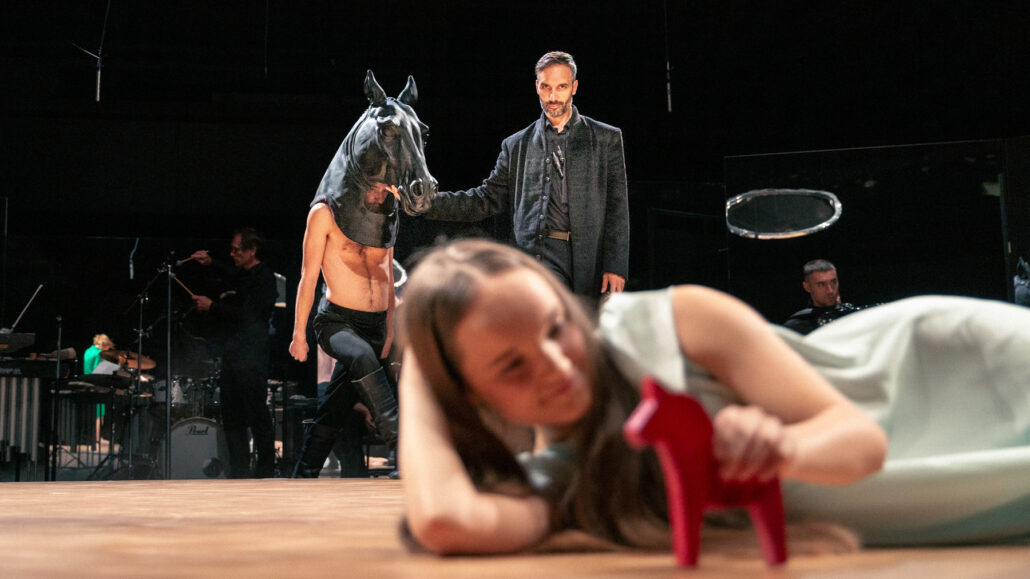
1 Antonín Dvořák: Rusalka, direction: Cabani, premiere 16. 12. 2022, Moravian Theatre, Olomouc.
2 Antonín Dvořák: Rusalka, direction: Dominik Beneš, Opera Studio Praha, outdoor performance in the castle park near the Antonín Dvořák memorial, Vysoká u Příbramě.
3 Sylvie Bodorová: Quo vadis, direction: Martin Otava, premiere 11. 6. 2022, J. K. Tyl Theatre, Pilsen.
4 Marko Ivanović: Monument, direction: David Radok, premiere 7. 2. 2020, National Theatre Brno.
5 Benjamin Britten: Peter Grimes, direction: David Radok, premiere 9. 10. 2021, National Theatre Brno.
6 Georg Friedrich Händel: Alcina, direction: Jiří Heřman, premiere 5. 2. 2022, National Theatre Brno.
7 Ondřej Kyas: Dýňový démon ve vegetariánské restauraci (The Demon Pumpkin in the Vegetarian Restaurant), direction: Tomáš Studený, Ensemble Opera Diversa, premiere 30. 10. 2010, Reduta, Brno.
8 In the past, the ensemble has also presented an inventive Janáček anecdote by the team of Ivo Medek – Alois Piňos and Miloš Štědroň: Věc Cage aneb Anály avantgardy dokořán (The Cage Affair, or the Annals of the Avant-garde Opened Wide), about a fictional encounter between Janáček and the American musical innovator Henry Cowell.
9 Tomáš Hanzlík: Poklad Arkádie (The Treasure of Arcadia), direction: Jakub Čermák, Ensemble Damian, premiere 9. 12. 2021 as part of Festival Schrattenbach, pavilion E Exhibition Ground Flora Olomouc.
10 Giuseppe Verdi: La Traviata, concept and direction: Veronika Loulová and Martin Talaga, Run Operun, premiere 5. 8. 2021, Stalin Letná (the space beneath the former monument to Stalin), Prague.
11 Slavomír Hořínka: Tak tiše až, direction: Miřenka Čechová, Spitfire Company and Orchestr Berg, premiere 5. 9. 2022, Komedie Theatre, Prague.
categories
Opera / Music Theatre / Seasons’ overview
AUTHOR
Helena Havlíková

 Learn
Learn

